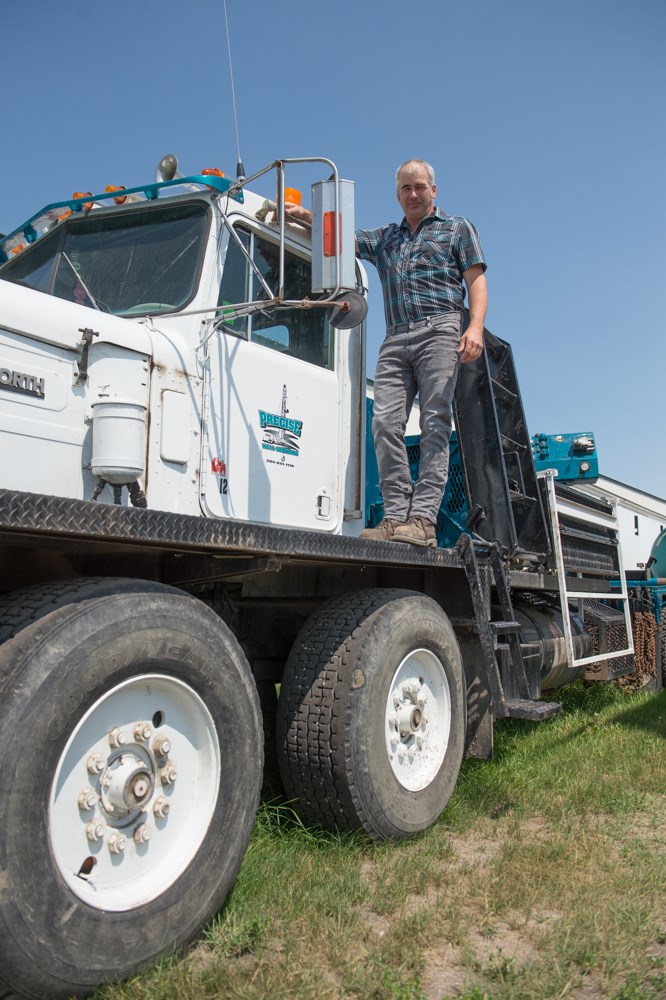Virden, Man. – When you drive into Precise Well Servicing Inc.’s yard south of Virden, Man., you’d be forgiven if you thought it was a decent sized farm. Well, it is, and Precise, along with sister company Premier Oilfield, located across the yard, are both outgrowths of that farm.
That’s according to Parry Chapman, who is one of four partners in the outfit. The others are Darren Chapman, Rob Chapman and Jeff Elliot. (See related story on .)
They’re not very picky on titles, but Parry fills the role of chief financial officer. “It derives from our large family farm,” he said. “It grew to a point where labour became an issue because of the oilfield, so we started investing in companies in the oilfield as a side investment.
Precise started out as a power tong outfit, Precise Tong Services Inc., but is now primarily a service rig company. They had five power tongs truck with Precise Tong Services Inc., but most are now parked and just one is active occasionally. Precise is now run as one entity, Chapman added.
As top-drive units like advanced drilling rigs became more common, Champman said they got into the service rig side. “We knew power tongs were not going to be as busy as they once were.”
Precise Well Servicing worked almost exclusively in southwest Manitoba, but it does occasionally go to southeast Saskatchewan.
“We do quite a bit of work in the Cromer area, and Waskada area, and in Two Creeks,” said Greg Alberts, operations manager with Precise. Two Creeks is along Highway 83, north of Highway 1.
They operate two service rigs with 13 people, including one on the tong side.
Alberts said, “I’m a service rig hand, pretty much from the jump. I worked in Estevan, in Alberta, northern Alberta, and all over. I’d land on another rig and just keep on it.”
He joined Precise for the opportunity to be the rig manager on its first rig, and his responsibility has grown from there.
Both of Precise’s rigs are singles. Alberts said, “We’re looking forward to getting some doubles. That’s a place we’d like to get to.”
“We do service rig work – completions, workovers, abandonments,” Alberts said. “Last year we did a ton of abandonments.”
Those abandonments were primarily in the Waskada area.
Regarding living with the downturn, Chapman said, “It’s a different pace. I guess a person’s got to adapt. This is probably the new reality, with oil prices where they’re at. For us, this is probably the first downturn we’ve encountered. We’ve learned lots.
Asked what that might be, he responded they learned to be a lot quicker in dropping rates. “When oil prices dropped, it seemed to be the rig rate, the hourly rate, was more important the efficiencies. The accountants take over more for the big businesses. They don’t realize that one five-man crew can be more productive than another five-man crew.”
Consultants might see that, but the accountants, not so much.
While they’ve survived the downturn, Chapman said, “Anybody who says they haven’t had equity eroded is lying. Some of the rates some of our competitors were running at … one of our classes of trucks went from $150 an hour to one of our competitors went to under $60 per hour. I’d like to say there was $90 of profit there, but that’s not the reality.
“It was pretty cutthroat.”
Service rig companies throughout the region are feeling the pinch when it comes to manpower, something Alberts said is affecting them. “We feel that exact same thing. I don’t think there’s a guy in the oilfield today whose not feeling the same pinch or crunch. We left a lot of guys behind, guys with experience. Those ten-year and 12-year guys, they’ve made different choices. They’re doing other things, now.”
As for recruiting, he said, “I look for the best I can get for any one position.”
But that may mean shaping people for those positions via training and mentorship.
Chapman said, “We’re surviving. There’s always room for more work. We’re probably doing better for manpower on the well servicing side. On the trucking side, you’ve either got six too many drivers, or you’re six short,” Chapman said.
With green hands, he noted training programs need to be top notch to continue to provide quality service to the customer.
The difficult thing is one rig is running steady, but the second rig is running with 50 to 60 per cent utilization. While they keep the staff working around the yard, they’re not making the money they would if their rig was active all the time.
“A lot of people have left the oil industry for jobs that are a little more stable,” Chapman said.
Alberts said, “There’s definitely a missing amount of experience with the guys around. Lots of guys made a different choice.”
“Until rates get back up to where they’re getting better pay…” Chapman said.
“For us, trucking is even harder, finding local bodies. Right now, probably 40 per cent of our drivers are local. The rest are coming from two or three hours-plus away, so you’re supplying accommodations for them. We have housing, and we’re in the process of setting up a camp for our own employees.”
Asked about plans for the future, Chapman said, “Survive and maintain.”




